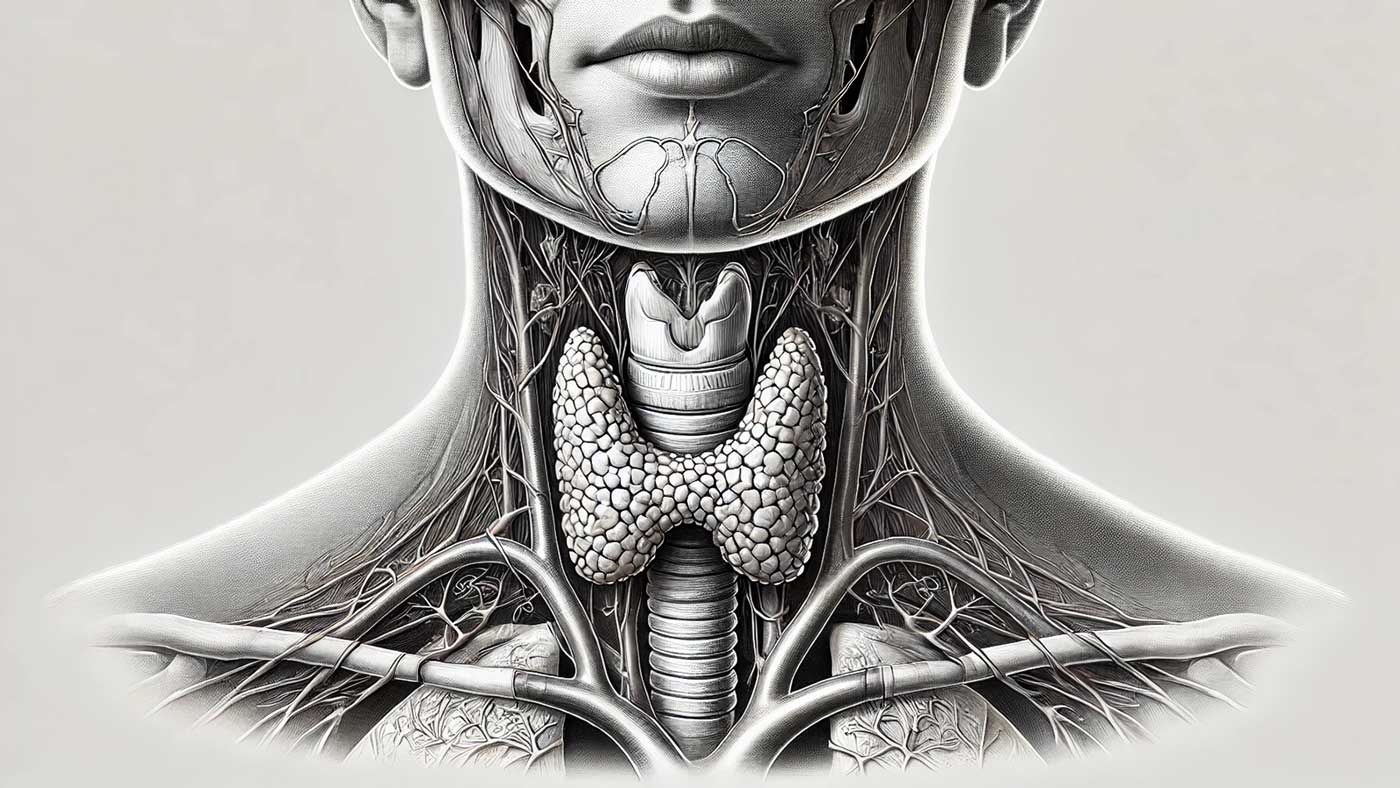The thyroid gland, a small yet powerful butterfly-shaped organ located at the base of your neck, plays a pivotal role in your overall health and well-being. Often overlooked until issues arise, the thyroid is crucial for regulating the body’s metabolism, energy levels, and various essential functions. Understanding the significance of this gland is vital for maintaining a healthy, balanced life.
In this article, we aim to shed light on the thyroid gland’s functions, the common conditions that can affect it, and practical steps you can take to protect and support its health. By gaining a deeper understanding of how this gland works and the factors that influence its well-being, you can take proactive measures to ensure it remains in optimal condition. Let’s embark on this journey to defend and protect your thyroid gland for life.
Table of Contents
Understanding the Thyroid Gland
The thyroid gland is a vital part of your body’s endocrine system. Shaped like a butterfly, it is situated at the front of your neck, just below the Adam’s apple and above the collarbones. This small gland, despite its modest size, has a significant impact on your overall health and well-being.
The thyroid gland’s primary function is to produce hormones that regulate your body’s metabolism. As an endocrine gland, it releases hormones directly into the bloodstream. These hormones influence a wide array of bodily functions, from how fast your heart beats to how efficiently your body uses calories from the food you eat. Essentially, the thyroid gland acts as a regulator of energy, ensuring that your body’s various systems operate smoothly and effectively.
The name “thyroid” is derived from the Greek word “thyreos,” meaning “shield-shaped.” This is a fitting description given the gland’s shape and its protective, regulatory role within the body. The thyroid is part of the broader endocrine system, which includes glands like the hypothalamus and the pituitary gland, both located in the brain. These glands work together in a complex feedback loop to maintain balance and harmony within your body.
Understanding the thyroid gland’s location and its crucial role as an endocrine gland underscores its importance. By appreciating how this small but mighty gland functions, you can better recognize the signs when something might be amiss and take steps to maintain its health for a lifetime.
Functions of the Thyroid Gland
The thyroid gland is integral to your body’s overall energy management. Acting as the body’s thermostat, it regulates how much energy your cells use, influencing your metabolism. The hormones produced by the thyroid gland—thyroxine (T4) and triiodothyronine (T3)—are crucial for maintaining a steady energy flow, ensuring that your body functions efficiently. These hormones affect almost every cell, regulating heart rate, body temperature, and how quickly you burn calories.
Without a properly functioning thyroid, your body could either slow down or speed up too much. An underactive thyroid (hypothyroidism) can lead to feelings of sluggishness, weight gain, and depression, while an overactive thyroid (hyperthyroidism) can cause symptoms like weight loss, anxiety, and rapid heart rate. Thus, the thyroid’s role in regulating body energy is paramount for maintaining a balanced and healthy state.
Overview of How the Thyroid Gland Is Regulated by the Hypothalamus and Pituitary Gland
The thyroid gland does not work in isolation; it is part of a sophisticated regulatory system involving the hypothalamus and pituitary gland in the brain. This system operates much like an orchestra, with the hypothalamus and pituitary gland acting as conductors, ensuring the thyroid produces the right amount of hormones needed for optimal body function.
The process begins with the hypothalamus, a small but crucial brain region that acts as a bridge between the nervous and endocrine systems. When the hypothalamus senses that the body’s energy levels are off balance, it releases a hormone called thyrotropin-releasing hormone (TRH). This hormone travels to the pituitary gland, another small gland located at the base of the brain, which responds by secreting thyroid-stimulating hormone (TSH).
TSH is the main signal that prompts the thyroid gland to produce and release its hormones, T4 and T3. These thyroid hormones enter the bloodstream and reach various organs and tissues, influencing metabolism, growth, and development. The levels of T4 and T3 in the blood provide feedback to the hypothalamus and pituitary gland, allowing them to adjust their signals and maintain hormone balance.
This intricate feedback loop ensures that the thyroid gland produces just the right amount of hormones, avoiding the extremes of hypo- or hyperthyroidism. It’s a finely tuned system that highlights the interconnectedness of our body’s processes and the importance of the thyroid gland in maintaining our overall health and energy levels.
Explanation of the Hormones Produced (T4, T3, Calcitonin) and Their Functions
The thyroid gland produces three key hormones: thyroxine (T4), triiodothyronine (T3), and calcitonin. Each serves distinct and vital functions in the body.
- Thyroxine (T4): This is the primary hormone produced by the thyroid gland. T4 contains four iodine atoms and is considered a prohormone. While it is not as biologically active as T3, T4 acts as a reserve that can be converted into T3 when the body needs it. T4 helps regulate metabolism, influencing how your body converts food into energy.
- Triiodothyronine (T3): Although produced in smaller amounts than T4, T3 is the more active thyroid hormone. It contains three iodine atoms and is crucial for many physiological processes. T3 enters cells and interacts with the nucleus, driving the production of ATP (adenosine triphosphate), which is essential for energy production and consumption. T3 helps regulate heart rate, body temperature, and metabolism and has a significant impact on brain development and function.
- Calcitonin: Produced by the parafollicular cells (C cells) within the thyroid gland, calcitonin plays a role in calcium homeostasis. It helps regulate the levels of calcium and phosphate in the blood, opposing the action of parathyroid hormone (PTH). Calcitonin lowers blood calcium levels by inhibiting the activity of osteoclasts, the cells that break down bone tissue, thus helping to maintain healthy bones.
Together, these hormones ensure that your body’s metabolic processes run smoothly, contributing to overall health and vitality. Maintaining the right balance of T4, T3, and calcitonin is essential for proper thyroid function and, by extension, general well-being.

Body Functions Regulated by Thyroid Hormones
Thyroid hormones are critical in regulating various bodily functions, ensuring your body operates efficiently and effectively. Here’s a detailed list of the essential functions influenced by these hormones:
| Function | Description |
|---|---|
| Metabolism | Thyroid hormones increase the metabolic rate of almost all body tissues, affecting how quickly you burn calories and generate energy from food. |
| Heart Rate | They help regulate your heart rate, ensuring it beats at a healthy, steady pace. |
| Body Temperature | By influencing how your body generates and uses energy, thyroid hormones help maintain a stable body temperature. |
| Brain Development and Function | These hormones are crucial for brain development in infants and children and support cognitive function in adults. |
| Mood and Mental Health | Thyroid hormones can affect mood, and imbalances may lead to depression or anxiety. |
| Digestion | They help regulate the speed at which food moves through your digestive tract. |
| Breathing Rate and Depth | Thyroid hormones influence your respiratory rate and the depth of your breathing. |
| Calcium Regulation | Through the production of calcitonin, the thyroid gland helps manage calcium levels in the blood and bones, supporting bone health. |
| Menstrual Cycles | They play a role in regulating menstrual cycles, affecting reproductive health. |
| Muscle Function | Thyroid hormones support muscle function and energy, contributing to overall physical performance. |
| Skin and Hair Health | They influence the health of your skin and hair, affecting their growth and texture. |
By regulating these vital functions, the thyroid gland ensures that your body operates harmoniously, highlighting the importance of maintaining thyroid health for overall well-being.
Common Thyroid Conditions & Causes
The thyroid gland, while small, is incredibly sensitive to various environmental and lifestyle factors that can disrupt its normal function. Many external and internal enemies can harm the gland, leading to a host of thyroid-related conditions. Understanding these harmful factors is crucial in taking preventive measures to protect and maintain thyroid health.
Harmful Factors Affecting the Thyroid Gland
By recognizing harmful factors, you can take steps to minimize exposure and protect your thyroid gland from potential damage. This proactive approach is essential for maintaining a healthy thyroid and overall well-being.
Radiation from Artificial Sources
Exposure to radiation from medical treatments, such as X-rays and radiation therapy, as well as environmental exposure from nuclear accidents, can damage thyroid cells and lead to conditions like thyroid cancer and hypothyroidism.
Endocrine Disruptors
| Source | Effect on Thyroid Function |
|---|---|
| Plastics | Chemicals found in plastics, such as bisphenol A (BPA) and phthalates, can mimic or interfere with the body’s hormones, including thyroid hormones, disrupting their normal function. |
| Coated Cookware | Non-stick coatings, often made from chemicals like perfluorooctanoic acid (PFOA), can release toxins that affect thyroid function. |
| Fireproofing Materials and Waterproof Clothing | These often contain polybrominated diphenyl ethers (PBDEs) and per- and polyfluoroalkyl substances (PFAS), which can interfere with thyroid hormone production and function. |
| Firefighting Foam | Contains PFAS, which are persistent in the environment and can disrupt endocrine function. |
| Most Carpeting | Carpeting may contain endocrine-disrupting chemicals that off-gas into the home environment. |
| Household and Personal Care Products | Many contain chemicals like triclosan and parabens that can interfere with thyroid hormone production and metabolism. |
| Fluoride and Chlorine | Found in drinking water and used in cleaning products, these chemicals can interfere with iodine uptake, essential for thyroid hormone production. |
| Certain Medications | Drugs like fluoxetine (Prozac) and fluoroquinolones (ciprofloxacin) can negatively impact thyroid function. |
| Processed Foods and Their Containers | Processed foods often contain additives, preservatives, and packaging chemicals that can disrupt endocrine function. These include BPA in plastic containers and harmful fats affecting thyroid hormone conversion and metabolism. |
Pesticides and Industrial Chemicals
| Source | Effect on Thyroid Function |
|---|---|
| Pesticides | Many pesticides contain chemicals that can disrupt thyroid function by interfering with hormone production and regulation. |
| Polychlorinated Biphenyls (PCBs) | Industrial chemicals that, despite being banned, persist in the environment and can accumulate in the body, affecting thyroid health. |
| Dioxins | Byproducts of various industrial processes that can interfere with thyroid hormone receptors and disrupt endocrine function. |
| Benzenes and Formaldehyde | Common industrial and household chemicals that can affect thyroid health through chronic exposure. |
Common Conditions as the Result of Harmful Factors
Exposure to the harmful factors listed above can lead to various thyroid conditions. Understanding these conditions helps in recognizing symptoms early and seeking appropriate medical intervention. Here are some of the most common thyroid conditions:
| Condition | Description |
|---|---|
| Subclinical Hypothyroidism | This condition is characterized by elevated levels of thyroid-stimulating hormone (TSH) with normal levels of thyroxine (T4) and minimal symptoms. It often serves as an early warning sign of progressing hypothyroidism. |
| Hypothyroidism | An underactive thyroid results in low levels of thyroid hormones, leading to symptoms such as fatigue, weight gain, feeling cold, brain fog, and depression. It occurs when the thyroid gland fails to produce sufficient hormones. |
| Hyperthyroidism | This condition involves an overactive thyroid that produces excess hormones, resulting in symptoms like rapid weight loss, anxiety, rapid heartbeat, sweating, and tremors. Causes can include Graves’ disease or excessive iodine intake. |
| Goiter | Goiter is an enlargement of the thyroid gland, often due to iodine deficiency or excessive hormone production. It can cause swelling in the neck and lead to breathing or swallowing difficulties. |
| Hashimoto’s Thyroiditis | An autoimmune disorder where the immune system attacks the thyroid gland, leading to chronic inflammation and often resulting in hypothyroidism. It is more common in women and can be triggered by genetic factors, infections, or stress. |
| Graves’ Disease | Another autoimmune condition, Graves’ disease leads to hyperthyroidism by causing the thyroid to produce excessive hormones. Symptoms include bulging eyes, weight loss, and rapid heart rate, and it is often associated with other autoimmune disorders. |
| Thyroid Cancer | Though less common, thyroid cancer can occur at any age. It typically has a high survival rate, especially for types like papillary and follicular thyroid cancer. Symptoms may include a lump in the neck, difficulty swallowing, and voice changes. |
Understanding these conditions and their causes is essential for maintaining thyroid health and seeking timely medical care when necessary.
Maintaining Thyroid Health
Maintaining optimal thyroid health is crucial for overall well-being, and several lifestyle factors play a significant role in promoting the health of this vital gland. By adopting healthy habits in areas such as diet, exercise, and sleep, you can support the thyroid’s function and help prevent thyroid-related disorders.
Diet
A balanced diet rich in essential nutrients is fundamental for thyroid health. The thyroid gland relies on specific vitamins and minerals to produce hormones and maintain proper function. Iodine is particularly important, as it is a key component of thyroid hormones. Incorporating iodine-rich foods like fish, dairy products, and iodized salt can help ensure adequate iodine intake. Additionally, selenium, found in nuts and seeds, and zinc, present in meat and shellfish, are crucial for converting thyroxine (T4) to the more active triiodothyronine (T3).
It’s also beneficial to include a variety of fruits, vegetables, and whole grains in your diet. These foods provide antioxidants and fiber, which help reduce inflammation and support overall metabolic health. Conversely, reducing the consumption of processed foods, refined sugars, and artificial additives can minimize the intake of harmful chemicals that can disrupt thyroid function.
Some other food factors to consider:
- Water Filtration: Filtering your drinking water is an effective way to reduce exposure to chlorine, fluoride, and other contaminants that can interfere with thyroid function. Using a high-quality water filter ensures that you are drinking clean, unpolluted water, which is essential for overall health and supports the thyroid gland’s ability to produce hormones efficiently.
- Organic Foods: Choosing organic foods helps minimize exposure to pesticides and herbicides that can disrupt endocrine function. Organic produce is grown without the use of synthetic pesticides and fertilizers, reducing the risk of ingesting chemicals that can negatively affect thyroid health. Additionally, organic animal products come from animals that are not treated with hormones or antibiotics, further reducing potential endocrine disruptors.
- Reducing Gluten and Dairy: For some individuals, gluten and dairy can contribute to thyroid dysfunction, especially in those with autoimmune thyroid conditions like Hashimoto’s thyroiditis. Gluten can trigger an autoimmune response in susceptible individuals, leading to inflammation and thyroid gland damage. Similarly, dairy products contain hormones and proteins that can interfere with thyroid function. Reducing or eliminating gluten and dairy from your diet can help manage and prevent thyroid-related issues.
- Avoiding Artificial Sweeteners: Artificial sweeteners, such as aspartame and sucralose, can disrupt hormone balance and negatively affect thyroid health. These substances can interfere with the body’s ability to regulate blood sugar and hormones, leading to potential thyroid dysfunction. Opting for natural sweeteners like honey or maple syrup in moderation can be a healthier choice.
Exercise
Regular physical activity is another important factor in maintaining thyroid health. Exercise helps regulate metabolism, supports cardiovascular health, and can improve mood and energy levels—all of which are influenced by thyroid hormones. Engaging in aerobic exercises, strength training, and flexibility workouts can enhance overall fitness and support the endocrine system.
It’s important to tailor exercise routines to the individual needs of those with thyroid conditions. For example, individuals with hyperthyroidism might need to avoid overly strenuous activities, while those with hypothyroidism can benefit from moderate, consistent exercise to boost metabolism and energy.

Sleep
Adequate and quality sleep is essential for properly functioning the thyroid gland. Sleep is closely linked to the body’s repair processes, hormone production, and immune function. Chronic sleep deprivation can lead to hormonal imbalances and increased stress, both of which can negatively impact thyroid health.
Establishing a regular sleep routine, creating a restful sleep environment, and practicing good sleep hygiene can significantly contribute to maintaining a healthy thyroid. Aim for 7-9 hours of sleep per night and avoid excessive use of electronic devices before bedtime to improve sleep quality.
Stress Management
Chronic stress can have a detrimental effect on thyroid health. The stress hormone cortisol can interfere with thyroid hormone production and conversion, leading to imbalances. Incorporating stress management techniques such as mindfulness, meditation, deep breathing exercises, and yoga can help reduce cortisol levels and support thyroid function.
Environmental Factors
Minimizing exposure to environmental toxins can also protect thyroid health. Using natural, non-toxic household and personal care products, avoiding plastics, and filtering drinking water to remove chlorine and fluoride are effective strategies. Reducing exposure to endocrine disruptors found in many everyday products can help maintain a healthy thyroid.
Regular Health Check-Ups
Regular medical check-ups and thyroid function tests can help detect any imbalances early and allow for timely intervention. If you have a family history of thyroid disorders or are experiencing symptoms of thyroid dysfunction, consult with a healthcare provider to monitor your thyroid health.
By adopting these lifestyle practices, you can support your thyroid gland and promote overall health. A proactive approach to diet, exercise, sleep, stress management, and environmental awareness can help maintain the delicate balance necessary for optimal thyroid function.
Conclusion
In summary, the thyroid gland regulates our body’s metabolism, energy levels, and overall health. Understanding its functions, recognizing common conditions such as hypothyroidism and hyperthyroidism, and being aware of the factors that can negatively impact thyroid health are essential in maintaining optimal thyroid function.
You can support your thyroid and overall well-being by adopting healthy lifestyle practices—such as consuming a balanced diet rich in essential nutrients, staying physically active, ensuring adequate sleep, managing stress, and reducing exposure to environmental toxins.
Taking proactive steps to protect and nurture your thyroid gland can lead to significant health benefits. Regular check-ups and staying informed about your thyroid health can help you catch any issues early and manage them effectively.
With the right information and lifestyle choices, you can maintain a healthy thyroid and enjoy a higher quality of life. Embrace these practices and take charge of your thyroid health today for a brighter, healthier future.
Additional Resources
The following resources provide comprehensive information on various aspects of thyroid function, disorders, and management strategies for those interested in exploring thyroid health further. These references include books, scientific articles, and reputable websites that can enhance your understanding and offer practical advice.
These resources can help deepen your knowledge of thyroid health and provide practical guidance for managing thyroid conditions. By leveraging these materials, you can make informed decisions and take proactive steps toward maintaining optimal thyroid function.
- Consumer Beware: The Ease of Deception in the Food Industry - October 28, 2025
- The Modern Plague of Addiction: Reflections on a Painful Subject - July 29, 2025
- Let Go to Grow: 10 Transformational Steps to Embrace Change and Thrive - July 29, 2025





